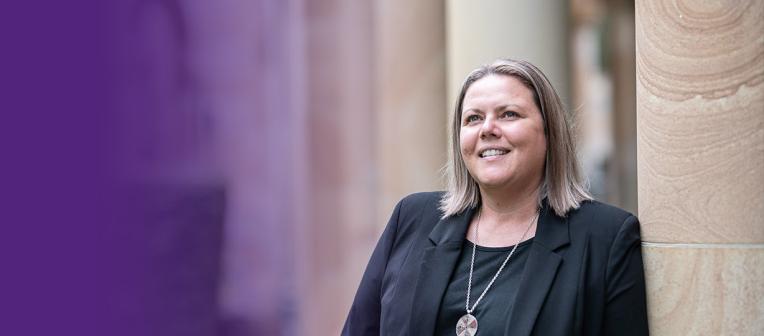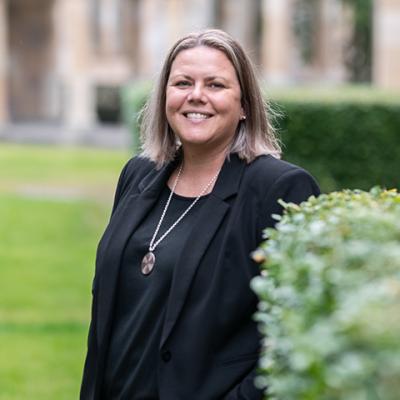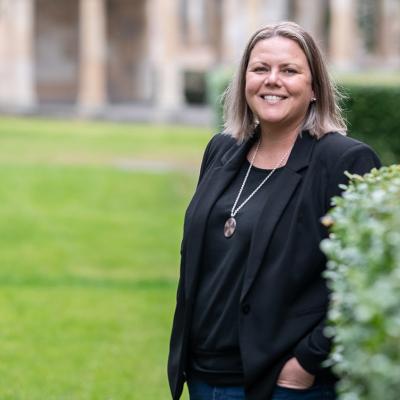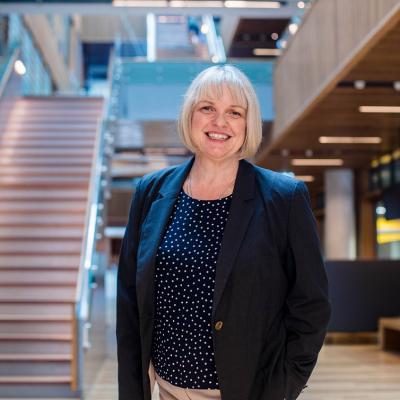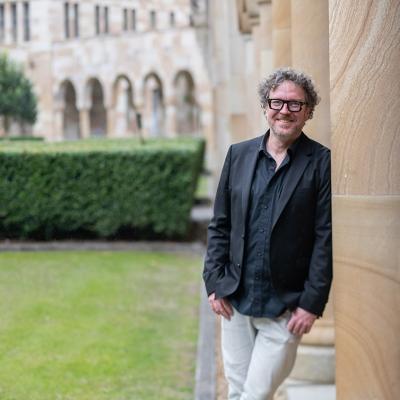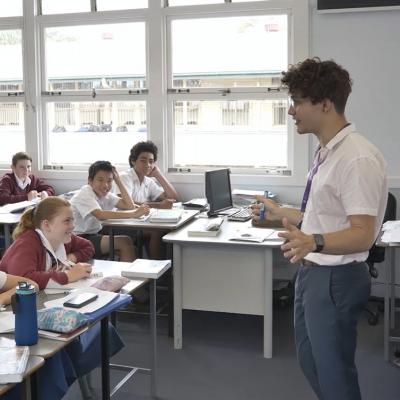From youth work to teaching and now research, Dr Marnee Shay knows a thing or two about what makes young people tick – and what doesn’t.
Marnee has dedicated most of her career to helping students feel more engaged and involved in their education and is now using her experiences to inform her research.
Even though she is best known at UQ for her pioneering research into flexi schools, Marnee has several projects constantly on the go. She’s a proud Aboriginal woman with strong ties to community and works with local Elders and groups to raise the voices of First Nations peoples in the education sector.
One common thread in everything Marnee does is a commitment to inclusive learning – and she isn’t afraid to think outside the box to achieve it.
Working with young people
Marnee began her professional career as a youth worker in a range of community settings. One role was as a youth support coordinator, where she worked with young people who were considered at risk of disengaging from mainstream schools.
“What I learnt from young people in that role was the kinds of school-based challenges they were facing, and I realised what an impact individual teachers had on them,” Marnee says.
This is what eventually inspired her to go back and re-train as a teacher.
“I was really inspired by those young people to think about what kind of teacher I could be and how I could help shape a positive outcome for them in schools."
Marnee’s learning curve didn’t stop there. When she finished her teacher training, she decided to take a position in a flexi school.
“These are secondary schools for young people who have been excluded, formally or informally, from accessing mainstream education,” says Marnee.
Find out more about flexi schools.
“I think my main motivation was knowing that the young people in flexi schools deserved the best education has to offer because of their circumstances, and I wanted to make a contribution to making their schooling experiences positive, after many had not had positive experiences with schools.”
Marnee soon discovered how rewarding it was to be one of those teachers who had a real positive impact on the lives of young people.
“It’s pretty well known the influence and impact that teachers can have on the students and their life decisions, and paths through life, and to me, that’s a real honour and a real privilege,” she says.
But there was still work to be done.
“My main lesson from being a teacher and youth worker was to listen to young people and know their story and give them space to sit and yarn,” Marnee says.
So Marnee set out on her next journey: to influence the future of education and make mainstream classrooms more inclusive spaces.
Teaching education undergrads
Marnee started at UQ in 2018 as a Senior Lecturer and Senior Research Fellow. She taught courses in Aboriginal and Torres Strait Islander education for around 10 years (in both schools and tertiary settings) before moving into her role as a full-time researcher.
Marnee explains that many undergraduate education students starting her course were often a bit hesitant and had preconceived expectations of what they were going to learn. But like so many other aspects of her life and research, she was committed to enhancing their learning experience, to engage with all her students.
“I brought Elders from the community and diverse Aboriginal and Torres Strait Islander people into the course so that students could hear from a diverse range of voices,” she says.
"This opened up students’ eyes to a whole range of stories and perspectives that they hadn’t heard of before.”
Marnee was helping to break down barriers and get education undergraduates more engaged in Aboriginal and Torres Strait Islander topics and cultures, so their interest and enthusiasm would filter into the classrooms in which they’d eventually teach.
“What I loved about teaching that course was that by weeks 4-6, you see this transformation happening where people are feeling less defensive and more open, and they’re going off and doing their own learning about their own context.”
Encouraging undergrads to continue making new discoveries in these areas was high on Marnee’s list of priorities too.
“I think what’s really important is teachers having a disposition of learning and ongoing learning, and a commitment to understanding the diversity of Aboriginal and Torres Strait Islander peoples and cultures.”
“So when undergrads would finish my course, I would say to them, don’t stop learning here – you’re going to learn from local people when you get your posting after your teaching training, and be really enriched by that, as you can’t learn everything in this one course.”
These days, Marnee is mostly focused on her research, but she still does the occasional guest lecture. She explains that sharing her research with education undergrads is an important aspect of her work, and being able to bring her findings straight to the lecture theatre gives UQ undergrads a definite edge.
"When you publish a journal article, it can take two years, but we’re able to bring these real-life research findings and learning back into our classrooms in a really quick way.”
It isn’t just the students benefitting from Marnee’s insights, either. Taking the time to talk with education undergrads reminds her that she's helping to change the schooling system through these bright young minds.
“I get really excited by undergraduate students who come with such enthusiasm and willingness to learn new developments in different fields and they’re so eager to go out and apply them in their everyday practices as teachers,” she says.
“I get a lot of energy from that, and I feel really excited for the future of the profession of teaching."
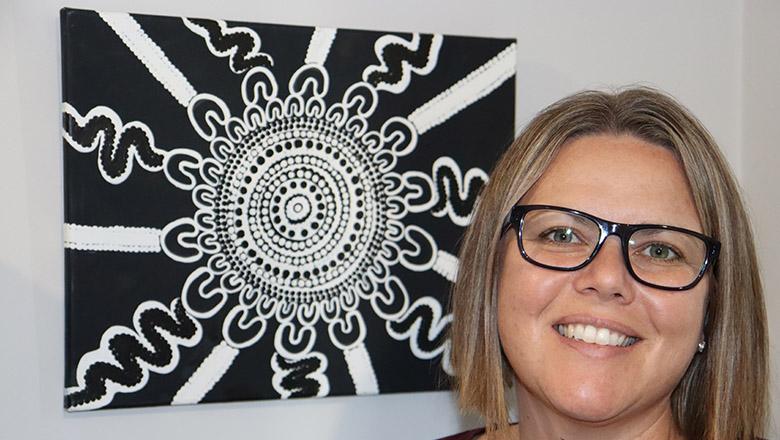
Marnee pictured in front of art by Aunty Denise Proud, which is the cover art on the book Marnee edited with Rhonda Oliver, ‘Indigenous Education in Australia: Learning and Teaching Deadly Futures’.
Adopting a strengths-based approach
When it comes to Aboriginal and Torres Strait Islander representation in schools, Marnee is adamant that more focus needs to be placed on empowering Indigenous teachers and students and supporting Indigenous education. This emphasis on looking at what’s working well, instead of focusing on problems, is what Marnee calls a ‘strengths-based approach’, and it’s something she implements in her research.
“Taking a strengths-based approach enables positive stories and what’s working to emerge, and that’s really important in Aboriginal and Torres Strait Islander education because the dominant narrative continues to be quite deficit.”
Using this approach to look at what is working in flexi school settings, Marnee outlines three key changes she believes need to occur to improve Indigenous education in mainstream schools:
- Use of strengths approaches that recognises and grow Indigenous excellence.
- Making space for, nurturing and affirming the identities of Indigenous young people.
- Enabling and creating new models for Indigenous leadership in school structures.
“This strengths-based approach enables people to see their work in Aboriginal and Torres Strait Islander education in a different way, and that’s what I’m striving for in some of my research.”
Marnee explains that one such research project is investigating co-design in Aboriginal and Torres Strait Islander education, and how schools, leaders and First Nations communities can work together to achieve more positive learning outcomes.
These steps in the right direction give Marnee hope for the future of education in Australia and motivate her to continue her important research.
“I grew up hearing a whole range of struggles that my Mum, and my Aunties and Uncles had to go through, being Aboriginal people in the 50s to the 80s, and there are still lots of struggles today,” Marnee says.
“But I get really inspired by people being willing to learn new things and maybe unlearn things at times. I get inspired by that change that’s happening.”
Marnee’s advice for aspiring teachers
Marnee has two key pieces of advice for any aspiring teachers ready to embark on their undergraduate studies in education.
- Be aware of what a privilege it is to be a teacher, and how important the profession is to many people, young and old.
- Know where your passion and commitment to teaching is coming from.
Her sound reasoning?
"I know for myself in my work, whether it’s been as a teacher, a lecturer or a researcher in these spaces, what has kept me committed to my work is knowing why I’m doing what I’m doing.”
Explore all the UQ programs that could help you create change, or meet some other UQ academics who are impacting the world in their own fields and their own unique ways.

